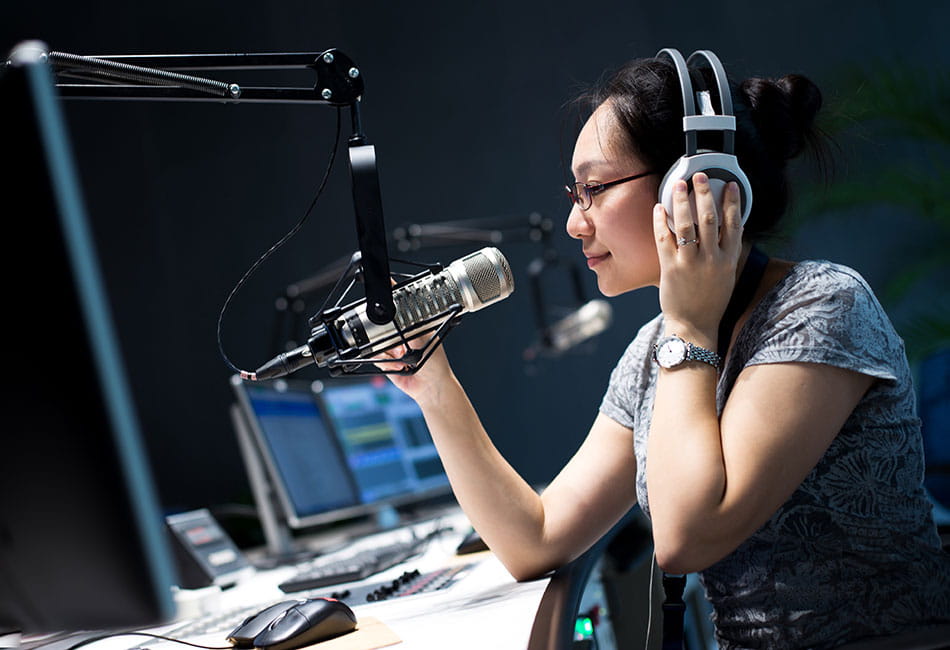
MA Journalism
This course is open for applications
About
UWE Bristol's MA Journalism course empowers students to master the latest multimedia storytelling techniques. Benefit from the unique BBC Mentor Scheme to gain invaluable industry insights and hands-on guidance to build your journalism career of the future.
Why study this course?
Our industry-led course provides you with the comprehensive education and training you need for modern digital and broadcast media jobs. Gain hands-on experience in our industry-standard radio, podcast and television studios, develop professional editorial, newsgathering and technical skills and judgment and build strong industry contacts and experience. You'll also be supported to advance your skills in your chosen long-form storytelling format - whether that's radio, podcasting, television or feature writing for digital or print platforms.
Why UWE Bristol?
As a creative student, you'll be perfectly placed studying in Bristol. A socially and politically dynamic city, Bristol is recognised as one of the UK's most vibrant media centres, with one of the highest concentrations of creative industries outside London.
We work with a wide range of broadcasters, publishers, and creative and cultural partners, including a strong partnership with the BBC. This has led to the development of a unique mentor scheme, pairing you with a BBC journalist who'll give you invaluable insights and support throughout your course.
Where can it take me?
You'll graduate with a broad range of career options available to you regionally, nationally and internationally. Equipped with essential skills and specialist knowledge, our graduates are well-prepared for entry-level roles in the journalism industry. Most have secured positions with the BBC, ITV, The Independent, and various local and national media outlets. Additionally, our students have been nominated for, and have won, local and national awards for multimedia journalism and audio documentaries.
Follow UWE Journalism on Instagram, X (formerly Twitter), and LinkedIn for news.
Student showcase
Watch: Welcome to the School of Arts at UWE Bristol
Entry
Entry requirements
We're seeking highly motivated students from any background, committed to creative growth in our supportive School of Arts community. Most applicants would have an honours degree in the arts or media related subject, but those with qualifications in other disciplines or prior professional experience are also encouraged to apply.
While some students enter the course after years of independent work, we also welcome entries from ambitious applicants directly from undergraduate courses.
International applicants
If you're applying to UWE Bristol from another country or region, visit the international study pages for tailored application information.
Selection process
Applicants will be asked to provide a personal statement for review.
Your personal statement should communicate confidently and coherently your rationale for application: what you hope Master's study will help you achieve in your future. You may want to include detail of the influences that have led you to application, and the attributes you think will be important for success as a postgraduate. We would like to know more about you, and your understanding of what we do.
Most personal statements we receive are around 500 words in length.
Applicants may be invited for an online interview, if we've any further questions about your portfolio.
English Language Requirement
International and EU applicants are required to have a minimum IELTS (Academic) score of 7.0 overall including at least 7.0 in the writing component and no lower than 6.5 in any other component (or approved equivalent*).
*The University accepts a large number of UK and international qualifications in place of IELTS. To find details of acceptable tests and the required grades, please visit English language requirements.
English language support
If you meet the academic requirements but require additional support to take your language skills to the required level, you may be able to attend one of our pre-sessional English courses. Students who successfully complete the pre-sessional course can progress onto their chosen degree course without retaking an IELTS or equivalent.
Read more about our pre-sessional English programme.
How to apply
Read more about postgraduate applications.
We accept applications throughout the year but if you are working to a funding deadline, you should build this into your application process..
Read more about international applications and key international deadline dates.
For further information
- Email: Admissions@uwe.ac.uk
- Telephone: +44 (0)117 32 83333
Structure
Content
You'll study a course carefully sequenced to deliver a dynamic student journey over three intensive terms.
In the first term, you'll be provided with opportunities to operate as a multimedia journalist, putting into practice journalistic judgement, news sense, and skills. You'll be introduced to legal, ethical, and regulatory frameworks and the practical outcome of their application.
At the end of the first term, you'll explore and connect arts research and discourse across a community of postgraduate peers. This will result in the presentation of bold, change-making creative proposals.
The second term will build upon the foundation of your multimedia journalism skills and will be enhanced with specific reference to TV and digital platform practices. You'll be introduced to court reporting in the UK, and your knowledge of professional ethics and legislative process will be extended. This leads into the third term, where you'll have the opportunity to realise your ideas within a supportive community of interdisciplinary practice, technical expertise, and academic criticality when completing your final project.
Throughout the year, you'll develop your understanding of enterprise within the creative industries and develop knowledge of the contemporary character and conventions of the creative economy. You'll have the opportunity to refine your professional skills, attributes and identity in preparation to succeed in an uncertain and complex cultural landscape.
The University continually enhances our offer by responding to feedback from our students and other stakeholders, ensuring the curriculum is kept up to date and our graduates are equipped with the knowledge and skills they need for the real world. This may result in changes to the course. If changes to your course are approved we'll inform you.
Learning and Teaching
Taught by a team with years of industry expertise across digital and broadcast platforms, you'll learn the future-facing multimedia journalism skills industry needs. Develop your passion for audio, video, or written storytelling through a combination of practice-oriented workshops and tutorials. Immerse yourself in the world of a real-life newsroom during our 'news days', and gain invaluable insight from events with industry experts from the BBC and beyond.
All School of Arts MA courses actively encourage cross-disciplinary discussion and multi-disciplinary interaction across our diverse community of postgraduate artists, filmmakers, designers, and journalists. This ensures you'll bring different perspectives to your creative practice.
See our glossary of teaching and learning terms.
Study time
This is a full-time course, which starts in September and runs for three terms over 12 months. Learning and teaching sessions typically take place over three days per week, variable across the academic year.
Outside of your contact hours, you'll be expected to get out into the city to find interesting and important stories, putting your new knowledge into practice. You'll also have access to our wide range of academic resources to help put that learning into a wider industry context.
Assessment
You'll be assessed through a range of methods designed to mirror professional practices in the journalism industry. These methods include presentations, portfolios, practical work and written reflection with ongoing feedback from tutors.
During your final term, you'll have the chance to specialise in your preferred storytelling format, audio, video, or written, to produce a long-form piece of journalism. This project is designed to showcase your skills and introduce you to the range of editorial, technical, and ethical considerations professional journalists navigate during their career.
Learn more about assessments.
Fees
Full time course
Supplementary fee information
Funding and studentship opportunities are listed on the Scholarships and bursaries page.
Find out more about funding and scholarships.
Read about postgraduate funding.
Features
Professional accreditation
This course is accredited by the Broadcast Journalism Training Council (BJTC).
Placements
As part of your degree, you're required to gain industry experience at professional journalism outlets. Past students have gained placements at the likes of BBC Bristol, South West News Service, Bristol Post, Bristol24-7, Ujima Radio and Bauer Media.
There are potential opportunities to gain further work experience in local, national or international media outlets and explore real stories on the streets of Bristol and beyond.
Fieldwork
We've a wide range of study visits but you're also expected to be out in the field producing journalistic material throughout the course.
Study facilities
Studying at Bower Ashton offers a base for our City Campus students, connecting teaching and learning with a range of renowned creative and cultural organisations in Bristol. Bower Ashton houses the main library supporting the creative and cultural industries and student support services.
Develop your skills in our industry-standard radio and TV studios, with the latest recording, editing, and production equipment to support studies in broadcast journalism, filmmaking, and creative media.
Take a personalised virtual tour of the Journalism facilities and experience what a typical day could look like here for you.
Learn more about UWE Bristol's facilities and resources.
Industry links
The Master's in Journalism at UWE Bristol has been developed in partnership with the BBC which also provides work placements, internships, guest speakers and mentors.
Bristol is a vibrant media city with many opportunities for work experience with the local digital and print publishers, like Bristol Post, Bristol24-7, and the Bristol Cable, alongside local television and radio stations including, ITV West Country, Bauer Media, BCfm and Ujima Radio.
UWE Bristol is a partner in the Pervasive Media Studio which is at the forefront of research and development of the creative technologies. We've strong links with a range of broadcasting organisations including Bristol Media, the Royal Television Society and South West NUJ.
Careers
Careers / Further study
MA Journalism gives you the skillset to enter digital and broadcast local and national newsrooms, plus a range of audio and video production companies and post-production facilities.
Our recent graduates now work at the likes of the BBC, South West News Service, The Independent and Bauer Media. Others have found successful careers in a range of industries, including publishing, media production, public relations and marketing, and among non-governmental organisations.
Our award-winning careers service helps you develop your employment potential through career coaching, a vacancy service for internships, placements, jobs, global opportunities, volunteering and community activity plus support for entrepreneurial activity, and access to employer events.
Learn more about our graduate destinations.
Life

Postgraduate support
Our support includes access to fantastic facilities, study tools and career consultants, plus practical help to access everything from funding to childcare.

Bristol
A stunning city for student living with all the qualities to make you want to stay.

Sports, societies and activities
There is more to your experience here than study. Choose to make the most of it and try new things.

Health and Wellbeing
We provide support in the way you need it.

Campus and facilities
Discover our campuses and the wealth of facilities provided for our students.


